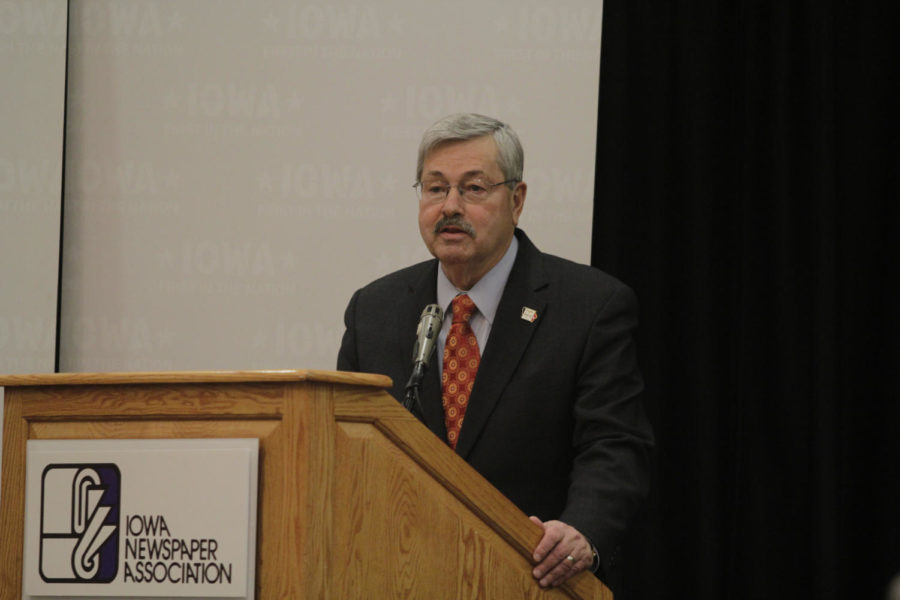Editorial: Proclamation doesn’t violate church, state
Kelby Wingert/Iowa State Daily
Iowa Gov. Terry Branstad speaks at the Iowa Newspaper Association Convention on Feb. 6 in Des Moines.
April 14, 2014
Last week Gov. Terry Branstad signed a proclamation “inviting all Iowans who choose to join in the thoughtful prayer and humble repentance according to II Chronicles 7:14 in favor of our state and nation to come together on July 14, 2014.” The Capitol grounds will host a gathering that day, with continual prayer from 7:14 a.m. until 7:14 p.m.
The biblical reference to which the proclamation referred reads, according to the New International Version of the Bible, as follows: “If my people, who are called by my name, will humble themselves and pray and seek my face and turn from their wicked ways, then I will hear from heaven, and I will forgive their sin and will heal their land.”
Obviously there is absolutely nothing wrong with the message of the group Prayer 7-14-14, which encourages all Americans to pray, fast and repent this coming July 14, just as there is nothing wrong with Terry Branstad acting as an advocate for this group. However, it is of questionable judgment for the Governor of Iowa to invite Iowans to prayer in his official capacity.
To be fair, the proclamations of Branstad are not equivalent to his endorsing whatever cause may be involved. This is stated as clearly as possible on his official website, where it says, “Issuance of a proclamation does not constitute an endorsement by the Governor.”
It may be a bit confusing to those unfamiliar with the governor’s proclamations, but they are actually a constituent service offered by the office that any group can request.
In fact, one day before signing a proclamation inviting Iowans to pray in accordance with a biblical verse, Branstad signed a proclamation announcing Muslim Recognition Day, a version of which he originally signed back in 1992 during his first tenure in the executive office. The proclamation was paired with a celebration at the Capitol Building showcasing Muslim food and information about Islam.
Receiving condemnations for each of the proclamations, Branstad has been accused of both being used as the plaything of Islamic extremists and of breaking down the “wall of separation” between church and state by sponsoring Christianity. In reality, he has done neither.
On top of the obvious rebuttal that recognizing the positive contributions and culture of Islam and Muslims in Iowa is not associated with extremism of any kind, the idea behind the separation of church and state is not that they can never touch lest they both crumble. Rather, the notion is that our government should tolerate any and all religious ideals, including those that would abstain from religion altogether.
By enacting a proclamation inviting “all Iowans” to pray, many of us might be quick to form strong opinions about Branstad’s action. We certainly did.
Upon seeing it in the proper context, however, it has become apparent that Branstad is not bestowing an unfair advantage or endorsement upon a particular religion or religious ideal. If, for example, a secular group wished to request a proclamation recognizing the good works of the atheists and agnostics of Iowa, there would be nothing to stop them.
Sometimes, especially when it comes to matters such as religion, we can all be hasty in judgment. Taking a step back and truly thinking about what is in front of us can help, as can realizing that while no one can force our views to change, neither can we abridge another’s ability to practice theirs.







